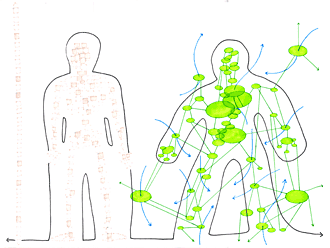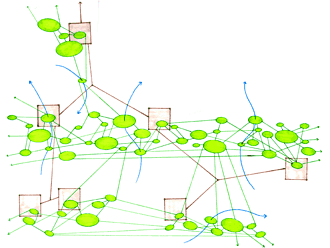 A few years ago, I published an essay in the journal Radical Philosophy titled, ‘Refiguring the multitude: from exodus to the production of norms’ (2005). It was about swarms, though I didn’t know it at the time. The publication was a coup for me. I was a struggling contract academic, vying for attention. Radical Philosophy was an ‘up there’ journal in political philosophy circles, edgy but respectable. My paper was one of the first academic responses to Multitude (2004), Michael Hardt and Toni Negri’s sequel to their best-selling book, Empire (1999).
A few years ago, I published an essay in the journal Radical Philosophy titled, ‘Refiguring the multitude: from exodus to the production of norms’ (2005). It was about swarms, though I didn’t know it at the time. The publication was a coup for me. I was a struggling contract academic, vying for attention. Radical Philosophy was an ‘up there’ journal in political philosophy circles, edgy but respectable. My paper was one of the first academic responses to Multitude (2004), Michael Hardt and Toni Negri’s sequel to their best-selling book, Empire (1999).
The essay was a bit of dog’s breakfast. But the crux of the argument resonates today. I have pasted some paragraphs below. If you are into Deleuze and social movements, this one is for you.
Re-reading ‘Refiguring the multitude’ for the first time in years, I am struck by how much of this material has become part of my mental DNA. I didn’t realise at the time, but ‘Refiguring the multitude’ was crucial to my intellectual development. Multitude certainly resonates with the high-tech world of 2013. Empire and Multitude are books you should have on your shelf, whatever part of the political spectrum you inhabit. They are books about globalization. Hardt and Negri are essentially right. Of course, they are wrong in important respects too.
The paragraphs from ‘Refiguring the multitude’ that I’ve pasted below are the crux of a line of thought that I started developing in 2002 or 2003. It was a response to the failure of the anti-globalization movement that got started in the 1990s. I was looking for a theoretical trajectory that would enable me to continue on the line of flight that I’d experienced at the height of this movement (1999-2001), this time reflecting on how swarms and social movements could contribute to creating something, in the first case, a new set of norms.
In retrospect, it is easy to see how I stepped from this argument to write Coalition of the Willing.
——————————————-

Source: Marc Ngui http://tinyurl.com/d8bdm9
An advantage of reading [Hardt and Negri’s concept of the multitude] through the lens of Deleuze and Guattari’s distinction between major and minor life is that it enables us to attribute a much broader set of capacities to the multitude than are granted by Hardt and Negri. Deleuze and Guattari define a ‘minority’ as the process by which a (social) mass departs from a given norm. The means and objectives of this departure can take many forms: from exodus for the purposes of altering the terms of a struggle to the articulation of demands for sovereignty and the recognition of rights. Deleuze was critical of universal human rights; yet minoritarianism implies the possibility that minor becomings can proceed in the name of rights. As Deleuze claims, ‘there are no “rights of man”, there is life, and there are rights of life. Only life proceeds case by case.’
Minor becomings can spearhead changes in jurisprudential convention. Becomings happen through the conjunction of radical differences, triggering complex reciprocal processes of transformation. We see an example of this when social movements trigger progressive developments in the normative structures of political and legal regimes. Paul Patton has persuasively argued that the jurisprudence of native title in countries such as Australia, Canada, and New Zealand can be understood in terms of the ‘becoming-minor’ of the legal fraternity, coupled with the ‘becoming-indigenous of the social imaginary.’ Such an application of Deleuze and Guattari’s work not only suggests a new and rich territory and research agenda for Deleuzean studies, but a strategy for deterritorialising the multitude from its metaphysical basis, opening a vast new range of capacities and possibilities.

Source: Marc Ngui http://tinyurl.com/d8bdm9
The ICT revolution is a sine qua non condition of the contemporary multitude. The multitude could not acquire the power to meaningfully affect global political arrangements without these new technologies. To be sure, it is doubtful that the multitude could emerge as a global phenomenon without the aid of internet and e-mail. Hardt and Negri are well aware of this fact. In their view, the contemporary multitude is a species of cyborg life. In the later twentieth century, they argue, new ICTs transfigured the object of biopolitical control, transforming human corporeality from an element of processes of production to a productive force in its own right.
This argument is fundamental not only for Hardt and Negri’s account of immaterial labour, but for the account of the democratic potential of contemporary TSMs. The contemporary multitude comes into being when biopolitics and technology conspire to create a virtual power, when ‘naked life is raised up to the dignity of productive power, or really when it appears as the wealth of virtuality.’

Source: Marc Ngui http://tinyurl.com/d8bdm9
The problem with collapsing absolute democracy into insurgency is that it leaves us incapable of using the concept to theorise the true powers of TSMs. To develop this theoretical platform, we need to wrest reflection free of trans-historical, metaphysical, schemas, and grasp the multitude in properly historical terms. This is what I have sought to achieve in this essay. I have argued that the contemporary multitude has its basis in the biopolitical networks set up by governments and international aid organisations, and its ontological genesis in the enabling power of new ICTs.
The multitude is a technologically mediated collectivity that leaps to the global level with demands that the world cannot ignore. In place of Hardt and Negri’s insurgent multitude, driven by the ‘will to be against’, I would posit an insistent multitude, driven by the right to life.”
Great article. You may enjoy the new book “Smart Swarm” by Peter Miller – really well written.
Thanks Simon. I’ll check it out. I’ve been enjoying your posts on Gadamer. 🙂
Thanks for the interesting link, Coalition of the Willing.
As for the journal Radical Philosophy, I don’t think they are radical enough. They should think more counter-intuitively, like arguing that all the bad things humans do eventually end up for the good. In other words, we develop through perverse, irrational means, mainly because we are incapable of doing the right thing from the beginning. For instance, we can’t understand peace until we experienced massive wars.
I remember being frustrated by that concept of the multitude when we read Empire together (such fond memories of that reading group!), but I could never have put my finger on the problem like you have.
I can start to see how this slippery-slope to metaphysics is a risk you run with writing in general. It’s almost impossible to describe contingencies without inadvertently rationalising them as necessities, or premises in a (hidden) argument.
Merleau-Ponty (my interest) suffers from this, but seems unaware of the problem.
It’s really a Platonic problem. The antidote is to stop writing, be more Socratic and just walk the streets and engage with the contingencies you wish to understand.
Makes me wonder about the domination of written over verbal communication today, and whether it plays a part in suppressing anything but a reactive posture toward empire.
Maybe its just taken 15 years for that life to build tools of minoritarian communication and networking that allow more verbal, contingent forms of writing.
Yes, I was frustrated by H&N too. The concept of the multitude seemed ideal for reflecting on emerging online social configurations, but their treatment was so vague and opaque…! Frankly, I doubt that either of them used the web much. You know, the first mention of social media in their work was last year in the Declaration on Occupy and the Arab Spring, which is astounding, given that they effectively anticipated the social web in Empire in 1999.
I like your solution to metaphysical thinking. Treat everything as a contingency. For sure, there may be universals, but how could we ever know? Better to start from the position that one is dealing with contingencies, each with it’s specific conditions. This was Foucault’s position: a nominalism with respect to (anthropological, in his case) universals – which is not to say they don’t exist, only that we need to learn to think and live without them.
Yes, all part of the project of moving beyond Platonism.
With respect to the continuing struggle between Empire and the multitude, I hope that developments like the maker movement and the emerging collaborative consumption movement/share economy will enable us to translate the minoritarian experiments that we enjoy online into real world social action. But that’s a whole other story…
Reblogged this on FentCiutat.
Reblogged this on maha's place.